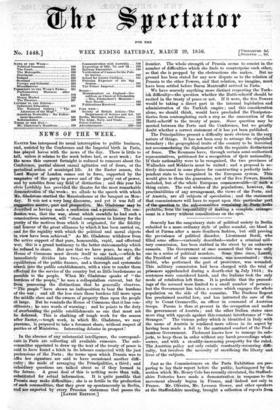NEWS OF THE WEEK.
EASTER has interposed its usual interruption to public business, and, assisted by the Conference and the Imperial birth in Paris, has played havoc with the news of the day. There is little to tell, unless it relates to the week before last, or next week ; for the news this current fortnight is reduced to rumours about the Conference, partial almost casual agitation out of doors, or the periodical action of municipal life. At the Easter season, the Lard Mayor of London comes out in force, supported by the magnates of the party in-power and of the party out of power, and by notables from any field of distinction ; and this year his civic Lordship has provided the theatre for the most remarkable demonstration of the week : we allude to the speech with which Mr. Gladstone startled the Mansionhouse at the banquet on Mon- day. It was not a very long discourse, and yet it was full of suggestive matter,-past and prospective. Mr: Gladstone may be described as having made a confession and a promise: The con: fesaion was, that the war, about which erewhile he had such a conscientious mistrust, will "stand conspicuous in history for the purity of the motives from which it originated, for the fidelity and honour of the great alliances by which it has been carried on, and for the rapidity with which the political and moral objects in view have been achieved." As Mr. Gladstone withdrew from the active support of that pure, honourable, rapid, and effectual war, this is a grand testimony to the better statesmanship which he refused to share. But now that we have peace, he says, the House of Commons must 'devote itself to one task,—which he immediately divides into two,—the reestablishment of the equilibrium of the public finance, and a thorough and systematic search into the public establishnients, with a view to render them effectual for the service of the country but as little burdensome as possible to the people. When Mr. Gladstone speaks of "the burdens of the people," he uses a colloquialism current, but far from possessing the distinctions that he generally observes.
The people "have shown no indisposition to bear the burdens of the war ; and all the less since those burdens fall more upon the middle class and the owners of property than upon the people at large. But he reminds the House of Commons that it has con- stituents; he uses words of warning ; and he points to the duty of overhauling the public establishments as one that must not be deferred. This is chalking off tough work for the season after Easter,—tough work, in which Mr. Gladstone, we may presume, • is prepared to take a foremost share, without respect of parties or of Ministries. Interesting debates in prospect !


























